- Home
- Jeff Mariotte
The Burning Season Page 8
The Burning Season Read online
Page 8
“I couldn’t say with any specificity. There are people who I’m glad aren’t associated with BOOM. I’m not one for funny hats or Hitler comparisons, let’s say.”
“Is there any direction you’d point us?”
“Look, I don’t know if anyone out there is involved in these attacks. I hope not. But if you’re asking if I think any of those groups might preach that sort of direct action, I would have to suggest that you take a close look at the Free Citizens of the Republic.”
“They’re pretty far out there?” Brass asked.
“It’s my understanding—very thirdhand, not through any direct knowledge—that they’ve been stockpiling weapons. That’s all I’m comfortable saying.”
“Very well, Mr. Watson, thank you.”
“Am I free to leave?”
Brass showed him a hungry shark smile. “One more thing. I’m sure you can tell us where you were this morning, between about midnight and one?”
“That’s easy,” Watson said. “The latest issue of Elementary had to go to the printer this morning. I was at my desk until after two, dotting Is and crossing Ts.”
“You’re a very hands-on publisher.”
“I’m a simple guy, Captain Brass. I preach personal responsibility, and that’s how I conduct my life and my business. I have editors and proofreaders, but every page of the magazine crosses my desk before it goes to the printer.”
“How about this afternoon?” Catherine asked. “Around two-thirty?”
“I was on a video conference call with associates around the country. I’d be glad to provide a contact list. And of course, I recorded the call for future reference.”
“Of course.”
“We were discussing how to save the country. While, of course, selling copies of the magazine and books. The free market is a wonderful thing—”
He was about to go off on another tangent, Catherine realized, and she didn’t think she could take it. “If you gentlemen will excuse me,” she said, “I have a lab I should really get back to.”
“Sure, Catherine,” Brass said. “We’re just about wrapped up here. I’ll talk to you later.”
“Okay. Nice to meet you, Mr. Watson.”
“Likewise,” he said. He flashed her a grin that seemed sincere at first glance. But it didn’t touch his eyes. They glittered but looked as cold as the most distant stars.
She let herself out of the room and closed the door gently. She hoped Jim wouldn’t be stuck for too much longer. It seemed that once Watson was wound up, he wouldn’t stop talking until he had run out of juice. Unfortunately, he hadn’t really said anything terribly pertinent to the investigation, with the possible exception of his comment about the Free Citizens of the Republic. Whatever, she didn’t have time to be a captive audience to one of his political rants.
Outside the interview room, she checked her cell phone. She had received a message from Tasha Ames, an acquaintance who worked at the County Clerk’s office. Tasha had asked for Catherine to call her back, and said it was urgent.
Catherine returned the call. “Thanks for getting back to me, Catherine,” Tasha said. “I don’t mean to pry, so if this is none of my business, just tell me.”
That’s never a good way to begin a conversation, Catherine thought. “What is it, Tasha?”
“Well, some paperwork just came across my desk, and I thought it was strange. Strange enough to check with you about, actually.”
“What is it?”
“It’s a lien. Against your house.”
“A lien?” Catherine stopped in the hallway, moving over to lean against a wall. She tried to keep her voice low, but suddenly felt like everyone was watching her, listening to her every hushed word. “Tasha, what are you talking about? I don’t owe anybody money.”
“I’m still making my way through it, and some of it looks strange. Have you hired a contractor named—wait, this can’t be right.”
“What? I haven’t used any contractors in ages.”
“I don’t know, this is weird. It says the contractor’s name is John of Tipton, and then in parentheses, Bakersfield. Just like that. First name John of Tipton, last name Bakersfield, but in parens.”
“I’ve heard some odd names before, but . . .”
“That’s what I mean, Catherine, this whole thing just struck me as off, somehow.”
“What’s the worst that can happen?”
“The worst? He can force you into foreclosure, make you sell your house so he can collect his money.”
“But I don’t owe any money.”
“It says here you owe fifty-eight thousand dollars.”
“That’s crazy.”
“Cath, I can ‘lose’ this for a while if you want me to. A couple of days, anyway, if that’ll help you find time to get over here and file a response. I know you’re busy.”
“I’m busy, but not too busy to fight some bogus sixty grand claim against my house. Anything you can do would be great, Tasha. It’s too late today, but I’ll be over tomorrow to see what steps I need to take.”
“That’s fine, Cath. It won’t go anywhere, trust me.”
“I appreciate the heads-up.”
“If I were you, I’d check in with your bank. Just in case. If this is some sort of harassment technique—”
“I get you. I’ll make a call. Thanks, Tasha.”
When she ended the call, Catherine’s hands were shaking. The idea that someone could file a claim against her, on completely nonsensical grounds, was infuriating. Part of living in a free country, she realized, was that people could bring all sorts of legal actions. Anyone could sue anybody else for anything, as long as they could get a lawyer to go along with it, or had the minimum legal knowledge to do it themselves. And although she worked with a number of attorneys and had a great deal of respect for the good ones, she also knew that slimy lawyers could be found under almost any good-sized rock.
When she had control of her own fingers again, she phoned her bank and asked for Carlton Weaver, the branch manager. He was on the phone in less than a minute. “Catherine, what a delightful surprise,” he said. “What can I do for you?”
She explained her mission, told him about the fraudulent lien. “I wanted to make sure nobody’s monkeying with my accounts,” she said.
“Hang on, let me just have a look.” She heard him breathing on the other end of the line, heard the tapping of computer keys. In a moment, he made a huffing sound. “Oh. Oh, my.”
“What is it, Carlton?”
“It appears that your accounts have been frozen, Catherine.”
“What? Well . . . unfreeze them! Who the hell authorized that?”
“I’m afraid it will take me a bit longer to find that out. Don’t worry, Catherine. I know you’re financially stable. I’d advise against making any withdrawals or using a debit card for the next hour or so. But I’ll be sure that you’re liquid before I leave my office for the day.”
“Thanks, Carlton,” she said. “You’re a lifesaver.”
She didn’t know how it had happened so fast, but she was convinced that these attacks on her had something to do with the offhand comment that had been reported in the news. Thanks to Benny the idiot, who would definitely have much to answer for.
And that name. John of Tipton (Bakersfield). She thought she had read something in a law enforcement journal about people who used strange aliases like that. She couldn’t recall the details—but she thought she knew who might.
She hurried back to the interview room. Only a few minutes had passed, and when she got there Brass was just seeing Alec Watson out. A uniformed officer waited to escort the publisher outside.
“Hold up a minute,” Catherine said, rushing toward them. She had to bite back the anger or else risk exploding at him. “I have another couple of questions for Mr. Watson.”
Brass couldn’t contain his surprise. “Really?”
“Inside, please,” she said. Watson obeyed, and Brass followed them back into the r
oom. This time, Catherine didn’t take a seat.
“Does the name John of Tipton Bakersfield mean anything to you?” she asked. “With parentheses. Bakersfield tacked on at the end in parentheses.”
Watson tipped his head back, gazing toward the ceiling, and grinned. “Oh, dear. You’ve met the Free Citizens.”
“What are you talking about?” Catherine demanded.
“I’d like to know what you’re both talking about,” Brass said.
“Some clown has taken a lien against my house. And someone’s frozen my bank accounts. The same creep, I’m guessing.”
“He’s got to be a member of the Free Citizens of the Republic,” Watson said. “They rename themselves that way. Their given name, then ‘of’ and their father’s surname. Finally, for their last names, they use the parentheses and the place where they were born.”
“Why the hell would they do that?” Brass asked.
“Because they’re nuts,” Watson said. “You think I’m joking. These people are so far out on the edge that they make me look like a bleeding heart liberal.”
“Explain, please,” Catherine said. “This is my life they’re screwing with.”
“Okay then, here goes. The Free Citizens of the Republic believe that there hasn’t been a legitimate United States government since we went off the gold standard in 1933.”
“I thought that was necessary to get past the Great Depression,” Brass said.
“I’m not telling you what I believe—although that point is open to debate—I’m telling you what they believe. A government backed by a currency that isn’t tied to something of real value—gold, in most cases—can’t be legitimate, they claim. Without that legitimacy, they don’t owe it any fealty. They refuse to pay into Social Security, or to carry Social Security cards. To use the names shown on their birth certificates would be an admission that the government is real, so they name themselves. They hate the idea of paying taxes, and most of them try to stay off the grid altogether. But they do surface from time to time, and they’re happy to use the workings of the government they despise to net people in a web of bureaucratic red tape. Lawsuits, liens, and so on. They’ll keep after people, sometimes for years, with little hope of ever winning any judgments, just for the sake of being a huge nuisance.”
“That they definitely are.”
“Every now and then, they do win a judgment,” Watson continued. “That just makes them worse, because it puts money—money not seen as legitimate, in their eyes, although that doesn’t keep them from spending it—in their pockets, and it encourages them to try it again.”
“And they’re after me because—”
“Because as of this morning’s early news, you’re the new poster girl for authoritarianism. You represent big, oppressive government, and you clearly have a grudge against freedom fighters.”
“I didn’t. But as of right now, if those people are freedom fighters then I could develop one in a hurry.”
“If they’ve already initiated proceedings against you,” Watson said, “your best bet is to challenge them. They probably won’t hold up, and you’ll be inconvenienced, but not destroyed.”
“That’s what I’m planning to do, Mr. Watson. Somehow, I had a feeling you’d be able to shed some light.”
“Like I said, they’re the fringiest of the fringe. I don’t disagree with them on taxes and some other issues, but they take things way too far.”
Brass stepped close to the taller man. “If you have any influence with them, Watson, make them back off Catherine.”
“If I had any influence, I’d disband them. I’m sorry to say I don’t. You’re on your own, Supervisor Willows. Tread lightly.”
“I’ll do that,” she said, her tone sharp. “Thanks for your concern.”
She left the room again, this time joined by Brass. The uniformed officer was still there, and he escorted Watson out the front door. Catherine and Brass trailed behind. Outside, news crews had taken up residence, and they shot footage of Watson stepping out of headquarters. He waved to the cameras, but refused to engage in dialogue.
Catherine noticed someone else, almost as tall as Watson and much bigger around, watching him go. The man had his hands on his hips, flaring his suit jacket behind him. She nudged Brass. “Jim,” she said. “One-fifteen. Isn’t that Garrett Kovash?”
“I believe you’re right,” Brass said. “I thought he was at the hospital watching over Daniels.”
“I thought so too. I guess we were both misinformed.”
“Wouldn’t be the first time,” Brass said. “Not by a wide margin.” He laughed. “In our business, it’s pretty much a given.”
10
THE INDIGO VALLEY Blood Center was located in an anonymously modern building, heaped with other, similarly nondescript structures into a medical office park. One-stop shopping for anything from a person’s first days to last, and all points in between, as long as there was a physical, mental, or emotional problem which a trained professional could hope to repair or manage. Usually at a high price, of course—med school didn’t come cheap, Ray knew from experience, and every doctor wanted to pay back student loans in a hurry, the sooner to reap the rewards of intensive study and hard work.
Ray didn’t blame them for that mindset, but he was glad it was in his past. There was little in the way of material goods he longed for, these days. He owned books and music, good Scotch, and a home with plenty of space to move around in. His desires now were, he was happy to admit, more cerebral—even, if he could be so bold, spiritual. He wanted to help others; in particular, he wanted to help the victims of violent crimes, or their survivors, reach some kind of peace with what had happened to them. Their lives could never be put right, but they shouldn’t have to carry difficult questions with them for all their days. Who did this? Why? To what end? With the exception of those who knowingly embraced a violent lifestyle, most crime victims were plagued by these concerns, as they sought to make sense of an inherently senseless act.
Ray’s life—this stage of it, anyway—was dedicated to answering those questions, and to helping ensure that the people who had committed violence against others didn’t get the chance to keep doing so.
He had been part of that medical establishment for years. More recently, he had seen it from the other side, as a victim and a patient. A psychopath named Nate Haskell had, in spite of Ray’s experience and precautions, played him and attacked him, and Ray had not only lost a kidney but had, in a very real way, lost his innocence. He understood now, in a more immediate and visceral manner than ever before, the one-two body blow of powerlessness and violation that crime victims knew. He was gripped by grief and rage that finally gave way to a grudging acceptance of his new status in life: victim, temporarily disabled, weakened, and vulnerable.
Pulling into the medical park’s lot, a momentary wave of nausea gripped him. He pushed it aside, knowing it was nothing more than a reaction to the environment, reminding him of his injuries, of seemingly endless physical therapy sessions, of the pitying looks people tossed him when they thought he couldn’t see, as he hobbled with his cane from place to place.
When he passed through the glass front doors of the Indigo Valley Blood Center, a young woman eyed him from the far side of a window. She sat behind a counter, and as he neared, she slid the window aside. “Can I help you?” she asked. “Do you have an appointment?”
He let bemusement win out over the flash of misplaced anger that rose in him first. “I’m not a patient,” he said, pulling back his blazer to reveal the badge holder hanging in his inside pocket. “I’m with the Crime Lab.”
Her eyes saucered. They were a striking shade of blue, edging toward violet. “Has there been a crime?”
“Not here,” he said. “But I am here on official business. I need to find out who the recipient of a marrow donation was.”
“I’m sorry, but that’s a privacy issue,” she said. “We can’t reveal that.”
“I understand the p
rivacy concerns, believe me. I’m a physician, and I volunteer at a clinic here in town. I’m completely sympathetic. But we have a situation here that trumps privacy. The recipient’s life might be in danger . . . or it might be too late altogether.”
“I . . . I’m afraid I can’t help you.”
“Who can? Please, I don’t have time for a lot of bureaucratic runaround. Just send me straight to the top.”
“Belinda Jones is our managing director,” she said. “I’m not sure she’s still on the premises, though.”
“Please check for me.”
She nodded and reached for her phone at the same moment. She touched a couple of keys, waited, caught Ray’s gaze. “She’s not answering,” she whispered. Then, “Oh, hi Belinda. There’s a police detective up here at the front. He’d like to speak with you. Okay, thanks.” She hung up the phone and met Ray’s eyes again. “She’ll be right up.”
He thanked her, without bothering to correct her misidentification of his job title. Most people, civilians, didn’t understand the difference. Any police officer in a uniform was a cop, and any cop in street clothes was a detective, even if he wasn’t a cop at all, but a scientist.
The receptionist pointed toward a bank of empty chairs. “You can have a seat there,” she said.
“I’m fine,” Ray said. Standing still for a long time was painful. But so was sitting and then standing again. Or lying down. Pain was a constant companion. At the moment, he thought standing was easiest, if it wouldn’t be too long. And if it was, he would make the woman call Belinda Jones again.
In just a minute or so, he heard the clip-clop footsteps of a woman in heels hurrying down the tile-floored hallway. A trim woman in a conservative gray dress came around a corner. He watched her fix a smile on her face. Her hair was black with a few strands of silver showing, and her skin was smooth and pale.
“I’m Belinda Jones,” she said as she neared him.
He let her see the badge, then allowed the jacket to close as he switched his cane to his left hand and offered his right. “Dr. Ray Langston,” he said. “I’m with the Las Vegas Police Department Crime Lab.”

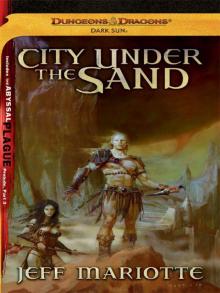 City Under the Sand
City Under the Sand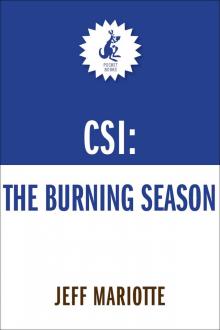 The Burning Season
The Burning Season Sanctuary
Sanctuary Winds of the Wild Sea
Winds of the Wild Sea Serpents in the Garden
Serpents in the Garden Close to the Ground
Close to the Ground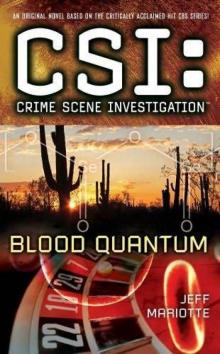 Blood Quantum
Blood Quantum Brass in Pocket
Brass in Pocket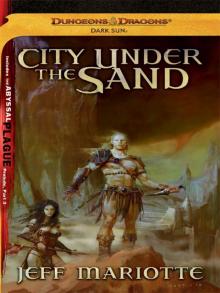 City Under the Sand: A Dark Sun Novel (Dungeons & Dragons: Dark Sun)
City Under the Sand: A Dark Sun Novel (Dungeons & Dragons: Dark Sun)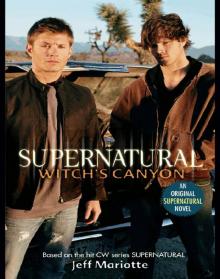 Witch's Canyon
Witch's Canyon STAR TREK: The Lost Era - 2355-2357 - Deny Thy Father
STAR TREK: The Lost Era - 2355-2357 - Deny Thy Father Dawn of the Ice Bear
Dawn of the Ice Bear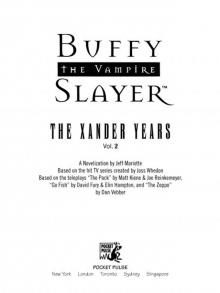 The Xander Years, Vol.2
The Xander Years, Vol.2 Ghost of the Wall
Ghost of the Wall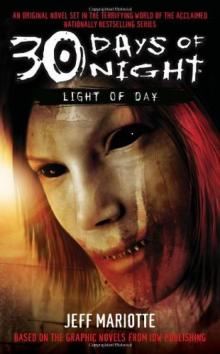 30 Days of Night: Light of Day
30 Days of Night: Light of Day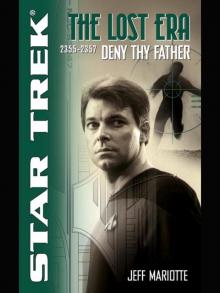 Deny Thy Father
Deny Thy Father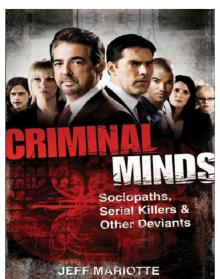 Criminal Minds
Criminal Minds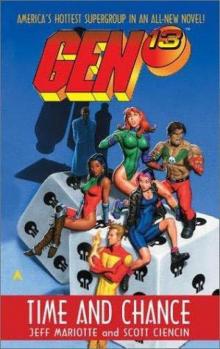 Time and Chance
Time and Chance The Folded World
The Folded World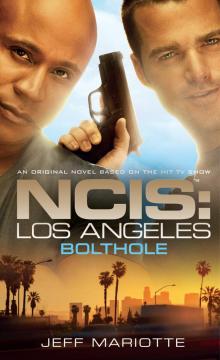 Bolthole
Bolthole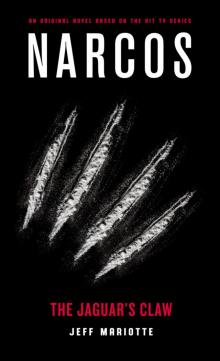 Narcos
Narcos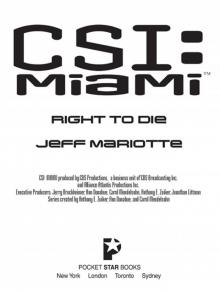 Right to Die
Right to Die